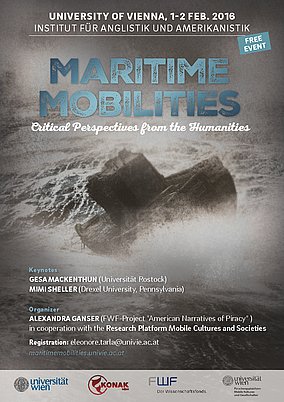An Interdisciplinary Conference
University of Vienna, Department of English and American Studies
Feb. 1-2, 2016
Since the first wave of globalization in the early modern period and at least up until the advent of mass aviation, maritime mobilities have been pivotal in the development of colonialism, slavery, and global capitalism. Today, with thousands of migrants and refugees dying in the Mediterranean during attempts to reach Europe in search of peace and living perspectives and oceanic pollution by often reckless industrial maritime endeavors (from overfishing and devastating oil spills to mass-tourist cruisers), maritime mobilities have again gained a criticality for the development of viable social, economic, environmental, and political futures. In addition, ships have remained temporary, mobile homes for maritime laborers and have become such for many other groups of people as well. As refugees and human smugglers, environmental activists, 'pirates' in Somalia and elsewhere, and maritime laborers cross paths with tourist and industrial mass mobilities in physically, legally, politically, and culturally fluid oceanic spaces, an arena of conflicting (im)mobilities emerges, co-constructed by the media and other cultural discourses that either defend or question oceanic power-asymmetries. For this reason, the social sciences and the humanities, informed by cultural studies methodologies, are important sites from which to explore both practices of and discourses on maritime (im)mobilities.
Mobility studies, a fledgling interdisciplinary field of inquiry, has addressed mobility (defined by John Urry as "socially produced motion" in his proclamation of a "new mobilities paradigm" in Mobilities, 2007) as a physical-geographical, material, socio-economic, and cultural practice. Inviting various approaches to mobility studies, this conference sets out to critically explore the multi-faceted world of oceanic mobilities and the work of their cultural representations from various disciplinary angles across the humanities and social sciences. It seeks to address representations and discourses of seafaring in literary and cultural expression, from comics to journalism, from film to material culture, and from critical to political theory, asking in what ways maritime mobilities are articulated and negotiated, affirmed and/or contested, and to what effect.
The conference is organized in cooperation with the research platform Mobile Cultures and Societies and is sponsored by the FWF.
Instead of a conference fee, there will be a box of donations for a project that supports refugees in Austria. For more information on the Ute Bock project, visit: http://www.fraubock.at/aktuelles/

American Studies
Universität Wien
Spitalgasse 2-4/Hof 8.3
1090 Wien
T: +43-1-4277-42410
Universität Wien
Spitalgasse 2-4/Hof 8.3
1090 Wien
T: +43-1-4277-42410





